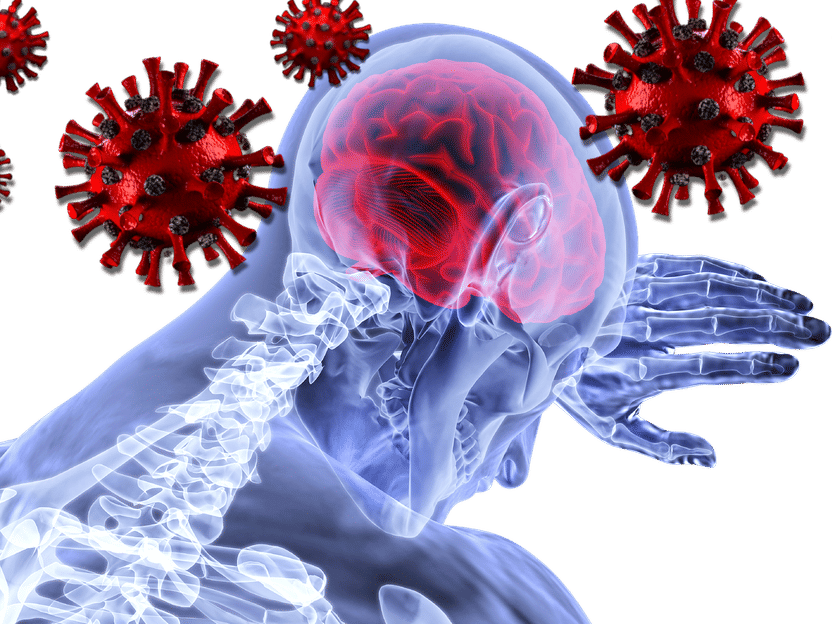COVID-19 can cause severe inflammation in the brain
Various immune cells in the brainstem cause formation of inflammatory nodules
Advertisement
Both during and after infection with the Coronavirus SARS-CoV-2, patients may suffer from severe neurological symptoms, including “anosmia”, the loss of taste and smell typically associated with Covid-19. Along with direct damage caused by the virus, researchers suspect a role for excessive inflammatory responses in the disease. A team of researchers from the Freiburg University Medical Center and the Cluster of Excellence CIBSS has now shown that a severe inflammatory response can develop in the central nervous system of COVID-19 patients involving different immune cells around the vascular system and in the brain tissue. The team led by Professor Dr. Marco Prinz, Medical Director at the Institute of Neuropathology, and Professor Dr. Dr. Bertram Bengsch, Section Head of Translational Systems Immunology in Hepatogastroenterology at the Internal Medicine II just published their results in the current issue of Immunity.

Symbolic image
pixabay.com
"Even though there was already evidence of central nervous system involvement in COVID-19, the extent of inflammation in the brain surprised us," says lead author Henrike Salié. "In particular the many microglial nodules we detected cannot usually be found in the healthy brain," comments lead author Dr. Marius Schwabenland. Using a novel measurement method, imaging mass cytometry, they were able to determine different cell types as well as virus-infected cells and their spatial interaction in previously unseen detail.
Disruption of the brain's immune response
"Until now, the inflammatory pattern in COVID-19 was poorly understood. Even compared to other inflammatory brain diseases, the inflammatory responses triggered by COVID-19 are unique and indicate a severe disturbance of the brain's immune response. In particular, the essential defense cells of the brain, known as microglial cells, are particularly strongly activated, and we also observed migration of T-killer cells and development of a pronounced neuroinflammation in the brain stem," says Prinz, who received the Leibniz Prize in 2020 for his research.
"The immune changes are particularly detectable near small brain vessels. In these areas, the viral receptor ACE2 is expressed, onto which the coronavirus can dock, and the virus was also directly detectable there," Bengsch adds, "It seems plausible that the immune cells recognize infected cells there and that inflammation then spreads to the nerve tissue, causing symptoms It is possible that early immunomodulatory or immunosuppressive treatment could reduce inflammation."
Immunological, virological, and neuropathological research
Professor Dr. Robert Thimme, Medical Director of Internal Medicine II at the Freiburg Medical Center and Vice Dean for Academic Affairs of the University of Freiburg Medical Faculty, emphasizes how high levels of scientific expertise and excellent cooperation between different research teams is a basic prerequisite for rapid knowledge gain in the pandemic. "Patient-oriented immunological, virological, and neuropathological research using state-of-the-art methods is a core strength at the Freiburg Medical Center. This study shows how we can contribute to understanding the disease processes in the Coronavirus pandemic through excellent research in Freiburg. While we already knew that a strong immune response is needed for recovery from Coronavirus infection, apparently a misdirected immune response can cause severe damage."
The study was made possible by Germany-wide collaborations with groups, including Professor Dr. Markus Glatzel from the Institute of Neuropathology at the University Medical Center Hamburg-Eppendorf (UKE), as well as researchers from the University Medical Center Göttingen and the University of Heidelberg.
Sponsors of this research included the state of Baden-Württemberg, three Collaborative Research Centers (SFB992, SFB1160, TRR179), and the German Research Foundation’s Heisenberg Program, as well as the Cluster of Excellence CIBSS Centre for Integrative Biological Signalling Studies at the University of Freiburg.



























































